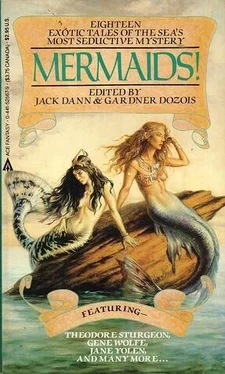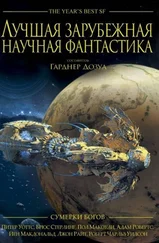Гарднер Дозуа - Mermaids!
Здесь есть возможность читать онлайн «Гарднер Дозуа - Mermaids!» весь текст электронной книги совершенно бесплатно (целиком полную версию без сокращений). В некоторых случаях можно слушать аудио, скачать через торрент в формате fb2 и присутствует краткое содержание. Год выпуска: 1986, ISBN: 1986, Издательство: Ace, Жанр: Фантастика и фэнтези, на английском языке. Описание произведения, (предисловие) а так же отзывы посетителей доступны на портале библиотеки ЛибКат.
- Название:Mermaids!
- Автор:
- Издательство:Ace
- Жанр:
- Год:1986
- ISBN:0-441-52567-9
- Рейтинг книги:5 / 5. Голосов: 1
-
Избранное:Добавить в избранное
- Отзывы:
-
Ваша оценка:
- 100
- 1
- 2
- 3
- 4
- 5
Mermaids!: краткое содержание, описание и аннотация
Предлагаем к чтению аннотацию, описание, краткое содержание или предисловие (зависит от того, что написал сам автор книги «Mermaids!»). Если вы не нашли необходимую информацию о книге — напишите в комментариях, мы постараемся отыскать её.
Mermaids! — читать онлайн бесплатно полную книгу (весь текст) целиком
Ниже представлен текст книги, разбитый по страницам. Система сохранения места последней прочитанной страницы, позволяет с удобством читать онлайн бесплатно книгу «Mermaids!», без необходимости каждый раз заново искать на чём Вы остановились. Поставьте закладку, и сможете в любой момент перейти на страницу, на которой закончили чтение.
Интервал:
Закладка:
The name Mylitta, goddess of moisture, reminds one of the Greek word thalatta , the sea... which is, certainly, moist... but as the Greeks (who had a word for everything) had two words for the sea, the other being thalassa ; one is reminded also of the Greek word Melissa , or bee .
[Well, actually, they had a third word ( pelagi ): but who counts?]
However, as for the mermaids' mirror, listen: "In China magical mirrors were used to foretell the future..." One of the magical powers of mermaids was that of prophecy. So, unless someone can come up real quickly with a reference to the moon-disk's being used to foretell the future, maybe it's back to the mirror, after all... though, of course, in a way, they
are both reflective....
How nice, "to meet a mermaid washing her silken sark by the stream" in the words of the learned L. C. Wimberly, author of Folklore in the English and Scottish Ballads . He says this was "evidently common experience; no special artifice was needed to get such a story believed." In which case no special credit would have been obtained by telling it. In which case no special reason was needed to make it up. How's that for remorseless logic? And has anyone ever spoken of remorseful logic? Don't answer that. Washing her silken sark by the stream: ever such a lovely alliteration; remember the bear-sarks? Who went berserk? Serk or sark, then, means skin... or garment ...and, by extension, skirt: to which it is obviously related; and shirt, just a bit less obviously. A cutty sark, in small letters, is a short garment, and, by extension, either a loose woman or a cut-down sail. The Cutty Sark was a famous sailing vessel, and a brand of whiskey is named after it. I was once, like the wedding guest in The Rhime of the Ancient Mariner , seized hold of, in England, by a very old man who proceeded to tell me that one of his cousins had been the last second mate on the ship Cutty Sark and that another of his cousins had shot the last man killed in a duel in England. It would have been even more interesting and to the point had he himself been an ancient mariner, but he was actually an ancient dentist. From time to time, though, I have had a mental image of a sailor, clad in a cutty sark, having had a drink of Cutty Sark, sent aft (or would it be forward?) to trim the cutty sark of the Cutty Sark . Whilst so engaged he espies a woman a-washing her cutty sark; "A mermaid!" he cries. Says the second mate, "No, she is only a cutty sark." Ah well.
Here is old Jacob Grimm, in his Teutonic Mythology , telling us that "Morolt [Who he? Go thou and learn: Grimm: Tute. Myth. Page 434, genuk. ] Morolt also has an aunt a merminne who... rules over dwarfs ... they dwell on a mountain by the sea, in an ever-blooming land... a precisely corresponding male being, the taciturn prophetic ... marmendill... coral is named [marmendill's smithery], he cunningly wrought it in the sea. [the mersay]... and the Fair Melusina... precisely the fairy being that had previously been called merrimenni ."
Listen, I don't want any complaints, Grimm will drive you crazy , no he never read The Chicago Style Manual; and oh God does he need an up-to-date editor! Shall we try to untangle this knotted mass of sea-wrack? There is an under-water creature called merminni and/or marmendill, also called a merfay, shall we say "sea-fairy"? Gad, we'd better.—of which one is the Fair Melusina; one of the many such creatures who deceitfully marry humans and get away with the masquerade until one night he espies her fish-tail, and—But for now: enough. Also, says Jacob, called merrimenni. Merrimenni.
It seems a curious thing that the merimenni , when they crossed the English Channel, were transmogrified into merrymaidens . Evidently the etymological connection of mer with sea had been lost; the minne, menni were seen to be masculine and thus in need of feminization; and the mer became merry , as in jovial. However. One never knows, and a quick trip to my dictionary tells me that merry , as in jolly, relates to an old word, murg , meaning short. In other words, cutty. As in cutty sark. Odd.
But there is obviously a form missing between merimenni and merrymaidens , and we find it in the title of Robert Louis Stevenson's The Merry Men . If you have read it, you will follow; if you haven't read it, go and read it. What a shame he felt obliged to end it so hastily. It is a mere cutty sark of a book; good, though.
Well, well, the merrymen. The singular of men is man, which will lead me easily to the word manatee, with which there is of course no connection ... grammatically, that is ... but with this Adventure there is a connection. It is a common-place to say, "The manatee, or sea cow, nursing its calf crooked in a fore-flipper above the surface gave rise to the legend of the mermaid." As it happens, alas, the manatee (we are told) nurses its calf below the surface: so, so much for that. It is also a commonplace to backtrack, and express wonder as to "How the manatee, or sea cow, with its huge almost shapeless head, and whiskers, could have given rise to the legend of the mermaid." And, with a few coarse digs in the ribs about the overheated imagination of sailors too long at sea, the matter is rather quickly dropped. Leaving it for me to pick it up and dust it off. Having dallied with the manatee, the practice is to go on and dally with the seal: the seal, it is pointed out to us, has a much more humanoid face, and so on. Well, heaven knows how often in hunting season human beings are shot by mistake for deer, and yet an upright biped does not look very much like a quadruped, does it? Before hunters used to wear dayglow jackets in orange and red they commonly wore khakies. There's a story that a countryman, accidentally shot by a city hunter who said that he "mistook him for a deer," went and had a hunting outfit made by the local awning maker: green and white stripes. And was shot by a city hunter; excuse? "I mistook him for a zebra." I can remember coming back with a flock of sheep in Galilee and being asked by a visiting girl from Chicago if I had left one of my sheep "back there"—looking "back there" I observed a perfectly normal-looking camel. So let us not be too hard if some people long ago thought that a seal was a human. It could have happened.
One wonders, though, how often it could have happened. How, for example, in such seal-rich regions as the coasts of Ireland, Scotland, Cornwall—regions rife with mermaid legends—could people not tell the difference between humans and seals? The answer is, they can tell the difference very well. And they say that sometimes the seals turn into people, and/or the people into seals. Often. And so that's one explanation. ... An old Scotch word for seal is "silkie," and aficionados of folk-songs will at once recollect the haunting old song made popular by Joan Baez: I am a man upon the land. I am a silkie on the sea ... Shades of Shapeshifters and Skinchangers, what, what? And so, without warning, I mention the name of sirens . And with that, the legend changes.
Faithful old Webster's Collegiate lists four meanings for the word, but it's chiefly the first which fits our needs here as follows: " One of a group of creatures in Greek mythology having the heads and sometimes the breasts and arms of women but otherwise the forms of birds that lured mariners to destruction by their singing. " To which most of us would echo, Birds? Originally, that is. The evidence is there on more than one surviving Greek urn or pickle plate. Ulysses is tied to the mast, the sailors are rowing away and we know that their ears are plugged: and there, swooping overhead are the birdies, with sure enough the heads and faces of women. Only later on did the sirens get, somehow, changed in form so that they seemed more as we think of mermaids.
Читать дальшеИнтервал:
Закладка:
Похожие книги на «Mermaids!»
Представляем Вашему вниманию похожие книги на «Mermaids!» списком для выбора. Мы отобрали схожую по названию и смыслу литературу в надежде предоставить читателям больше вариантов отыскать новые, интересные, ещё непрочитанные произведения.
Обсуждение, отзывы о книге «Mermaids!» и просто собственные мнения читателей. Оставьте ваши комментарии, напишите, что Вы думаете о произведении, его смысле или главных героях. Укажите что конкретно понравилось, а что нет, и почему Вы так считаете.











![Гарднер Дозуа - Книга Мечей (сборник) [litres с оптимизированной обложкой]](/books/427839/gardner-dozua-kniga-mechej-sbornik-litres-s-opti-thumb.webp)